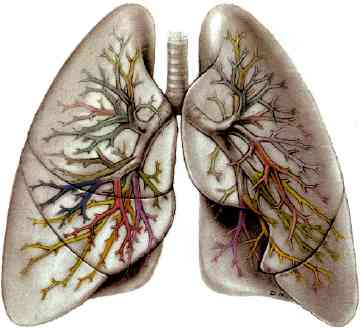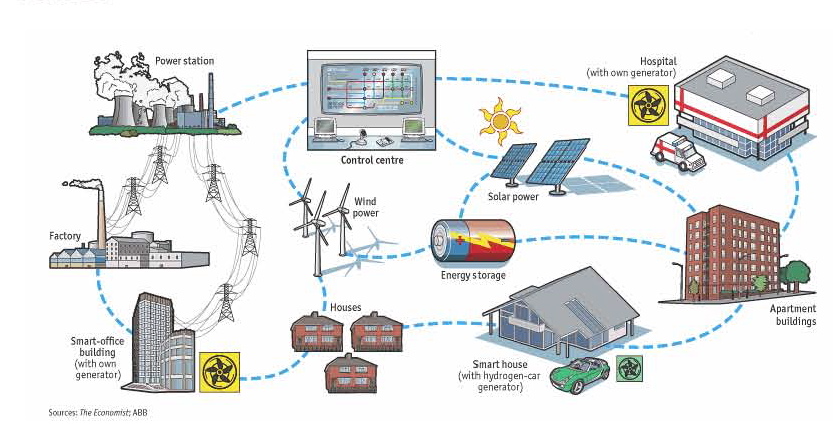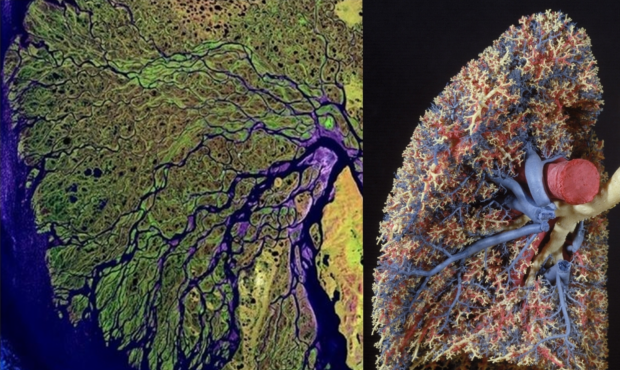The amount of local cooperative energy-companies in the Netherlands (in 2012) is increasing. It all has to do with the decrease of the price of solar-sells but there is more at stake.
Local energy-companies are part of a movement aimed at Autarky. Autarky is the quality of being self-sufficient.
The word Autarky comes from Greek αὐτάρκεια (autárkeia), itself from αὐτός (autós) = self and ἀρκέω (arkéo) which in its passive form means be satisfied, content or “Out of my own Power“.

Fractal Human Energy Distribution Network
The need to become self-sufficient has certainly to do with the current economic-, ecological- and energy crisis. People are afraid that the supply of vital energy and food will suddenly stop or become priceless. This is not the only reason.
Some people think we are wasting our money, food and energy by producing nondurable throw-away goods in which the packaging is sometimes more important than the content. They want to create durable products and services. This is not the only reason.
Some people don’t trust the suppliers of their food and energy, their politicians and/or the caretakers of their savings, the banks, anymore. They believe that their food is intentionally manipulated, their savings are wasted, their country is sold out to the rich and their environment is polluted for just one simple reason, Greed, the opposite of “Being Satisfied”.
The people of the autarkic movement want to recreate the necessary functions (bank, energy, food, work, healthcare, government) themselves in a cooperative way in their own living context.
The local cooperatives are now joining on a higher (mostly country) level and are in need of a shared (real-time)infrastructure. The current infrastructure does not support flows that move between many participants (so called peer-to-peer-networks).
The current system is a Hierarchic Top Down System containing Huge Highways that are connected to Big Production-facilities. This makes it impossible to consolidate, share and distribute resources peer-to-peer on a local level.

The Electric Highway
The Top Down System has created Global Markets where the local production is sold to the highest bidder.
The Global Markets are the playing field for advanced speculators that make a lot of money. After the deal is made the local production is transported to a far away destination. That is the reason why the Top Down Systems are integrated in world-wide Logistic Systems.
If we want to coordinate all the local initiatives we need advanced systems that Up- and download, control, predict, connect, share, balance and distribute vital local resources on the short and long term.

The Panarchy Cycle of an Ecology
Examples of these systems can be found in “crowd funding“, “virtual power plants” and “treasury management” (balancing many small amounts of Money at the short and long term).
In Nature we find comparable (Fractal) Distribution-Systems in the Lungs, the Arteries, Riverdelta, the Weather Cycle and Ecologies.
All of these fysical Flow Systems, that map 1 Resource-> on Many Resources or Many Resources->on 1 Resource, are based on the third Law of Thermodynamics called Constructal Law.
In the philosophy of the Stoics and Cynics of Ancient Greece the perfect human was not only arete (“all-around excellent”) but also independent of every need. Arete was associated with a full life as a citizen of a city.
Later Spinoza (“On Human Freedom“), Rousseau and David Thoureau (Walden) have developed their own autarkic philosophy.
Autarky was the ideal of a complete man who needed no one and no organization. This ideal can also be found in Zen Buddhism, Taoist practise, Early Christians (Nazarites), the Catholic Order of the Franciscans and the Protestant Quakers.
In reality it is almost impossible to be completely self-sufficient as a lonely human being. We need others when we are young, sick and old and we need others because we are specialized (“Talented”). Autarky is a possible aim for a small community.
The religious, cultural and political movements at the left and the right aimed at living the “good life” (“Living Slow“) are converging in the movement of the Cultural Creatives. The Cultural Creatives are the new Elite that is moving to the AND-state (Left AND Right).
They don’t believe in the old Competitive Ideologies (Socialist, Capitalist, Religious, Liberal, Nationalist, Conservative, Globalist, etc..) but want to focus on the Shared Collaborative Values between all Humans. We all need Love, Food and Shelter.
Autarky has always been a major political aim of countries. Autarky is about the possibility to control your own future and to become independent of other powers that could use your dependency to tell you what to do to get what you desperately want.
At this moment the shortage of fossil fuels, especially oil and gaz, is used to influence the policy of other countries and is the cause of local conflicts in the Middle East.
China is buying all kinds of vital materials to make sure their economy will not become dependent on others. If they will succeed and nobody doubts about that, they will become the economic controlling power of the world.
Reaching a state of local autarky, being satisfied with what your environment provides you, has become the aim of the wordwide sustainability movement.
Total autarky is possible when you want to live as a stoic or a survivalist. Most people accept a more simple living, move off-the-grid and build autonomous buildings that make use of renewable energy.
Others start to farm in their own backyard, join an allotment garden or move back-to-the-land and practice sustainable agriculture. To handle their surpluses and shortages independent local markets are created that make use of alternative currencies.
A strive for (regional) Autarky pushes the need to innovate to a higher level because not all regions contain the right materials, knowledge or experience to realize everything everybody needs. To become fully Autarkic the Production and Consumption Systems in the Region have to be based on simple concepts and parts that are available everywhere. Simple concepts are concepts that are easely copied.
The only way to combine Simple and Complex concepts is to use the Concept of Self-Reference (Fractals). The only way to make use of parts that are available everywhere is to make use of the Simple Building Blocks of Nature. A good example is the use of algea in food processing.
The concept of Autonomy not only plays an important role on the many levels of human (personal, organization, country) and animal society (Competitive vs Collaborative (Ants)). It is also a major subject in the research of (Second-Order) Cybernetics (Control Theory).
Second Order Cybernetics is concerned with the Control of the System of Systems (the Meta-System). Hierarchy is not the solution to this problem because it leads to the logical problem of Infinite Regress (“Turtles on turtles on … all the way down”).
The Meta-System is controlling, reproducing and balancing itself by a Fractal Feedback-Cycle that moves Backwards (Consumption) and Forwards (Production).
The concept of Self-Reproduction is called Autopoiesis or Autocatalysis. The Design Philosophy of Cradle to Cradle is a good example of Autopoiesis.
A System is an Autarky if all its Levels are capable of Self-Reproduction.
If a human wants to become self-sufficient he has to accept and develop his own talent and find complementary people so he is able to create a Self-Reproducing Unit.
The smallest Self-Reproducing Unit in Human Society is the Family living in one House. This House has to produce more than enough Energy and the Garden has to produce more than enough food to support the Family.
If we cluster all these Self-Reproducing Families/Houses & Gardens in a small City the chances are high that the combined talents of the families will be able to supply every profession needed if the people of the city want to Live a Simple Life.
It is also possible that the surplusses and shortages of the families can be compensated by creating a Market on the level of the small City or one level higher, the Region.
An Autarkic Movement becomes an Aggressive Competitive Nationalistic Movement when the Citizens of the Country feel that their Country is plundered by outsiders and their Leaders promise to get it all back by expanding the Space to Live (“Lebensraum“) to facilitate everything that is needed.
This happened when Germany was preparing for War after the enormous reparation payments of 132 billion gold marks to the Winners of World War I.
The Autarkic Movement could also become a Peaceful Cooperative Social Movement like the Movement of Gandhi in India when the people accept the Good Life they already live and want to share the surpluses with others who are in a worse state.
LINKS
Dutch Report about Local Energy Companies (in Dutch)
About the house that produces his own energy (Passive House)
The Complete Book of Self Sufficiency
About Fractal Distribution Systems
Jerry Rifkin: About the Distributed Economy
The John Seymour School for Self Sufficiency
About the EU Policy of Smart Specialization of Regions
About Darwin and Collaboration
About the Thermodynamics of Living Systems
About Worldviews (How to find Complementary People)
About the Viable Systems Model of Stafford Beer
The Autarkic Dreams of Germany






